Creativity and Inventiveness
As I closed the week last night, swept the floor cleared off the bench and put the tools in their places, the overwhelming feeling was the thankfulness for my work. Talking to my friend, Eddie, as we drank our coffee in the cafe this morning, I said my craft isn’t like most people’s daily work. If I developed some disease like say carpal tunnel syndrome, caused by the repetitive tap, tap tapping of keys for hours on end or any other debilitating disease it wouldn’t be a choice for me to stop doing it. Of course, I realise that some incurred disabilities are just impossible to continue with. I see that, but in many ‘jobs’, it wouldn’t be a hardship to the point of impossibility to stop that kind of work and find some other to, well, just replace the income stream with a different job type. I have another friend with so much continuing back pain she simply cannot function barely at all and even doing nothing is painful with every movement made. No, what I am saying here is that many jobs are simply mundane and tiresome. There are ingredients to our working, in the doing of things work, where we engage our bodies and our minds differently to others. We use buildings and equipment, things tangible and intangible but none of it takes a really creative mind; some daily work day in and day out is positively mindless, thankless, isolating, unwholesome, debilitating, dull and boring. My woodworking with hand tools has never been that in 58 years in the doing of it. I find my work to be continually inventive and especially for me is this so. Hand tools offer me multiple options to use non-typical tools for conventional tasks. When I need a 4″ length of rebated stock 1″ by 3/4″ with a 3/8″ by 3/8″ rebate I simply run pencil lines to depth and width and run a tenon saw down and along the two lines to remove the step-down corner. I can do this in a 24″ length with a 12″ or 14″ tenon saw too.
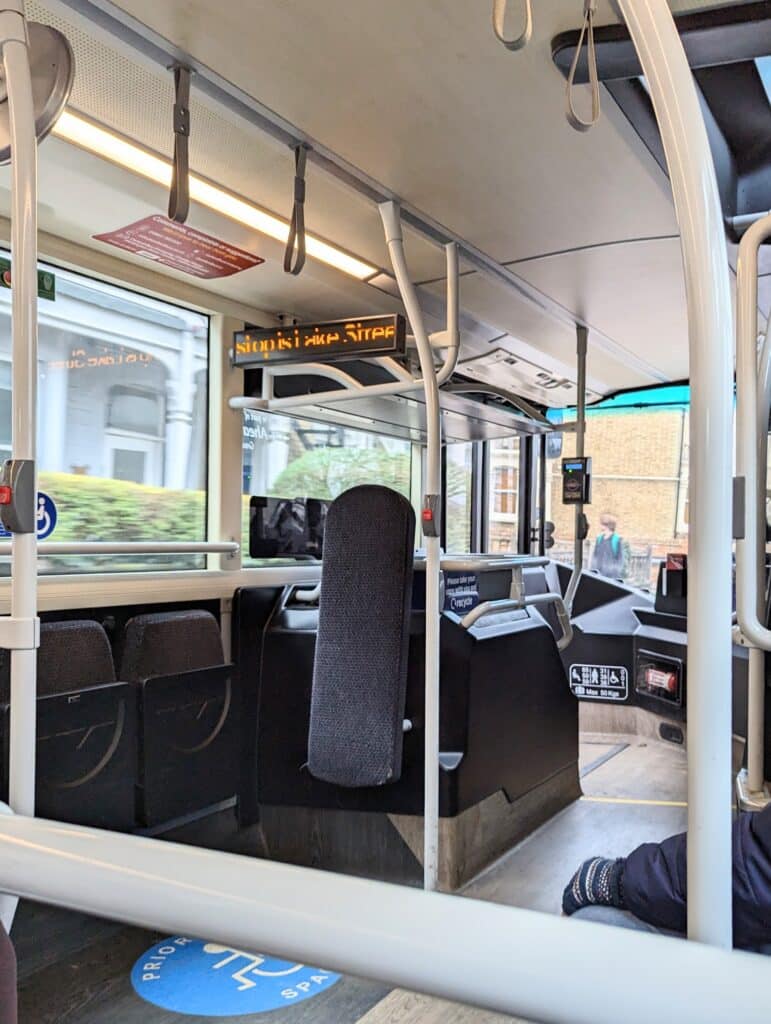
I wonder all the time about the people that drive my bus or serve me coffee in the mornings. Working to a prescribed pattern or route leaves mostly life choices so my life using creativity only is not the reality for most working people and especially in situations where an end result is never seen. Of course, there is an art to almost everything we do in a day be that driving the bus or making the diverse range of coffees available to us today. But this is not really the same as converting wood into a piece of furniture or writing a poem to earn our living from. The bus route is as fixed as the coffee machine grinding the beans, passing steam through for heat and delivering it to the customer using patterns that guarantee a consistent outcome. I have thought about this a lot throughout my life as a maker and came to the conclusion that if we take away this thing called creativity we remove the very soul of work. Working with hand tools, 99% of woodworking is either spent negotiating and solving problems or anticipating them ahead of tasks so that when we get to that certain point we haven’t created an issue that catches us out. I have concluded a couple of complex joinery tasks to the point of final assembly in glue-up only to find that I could not insert that final piece because I went out of order. Dismantling a project like that can be very messy at best and sometimes even impossible to do.
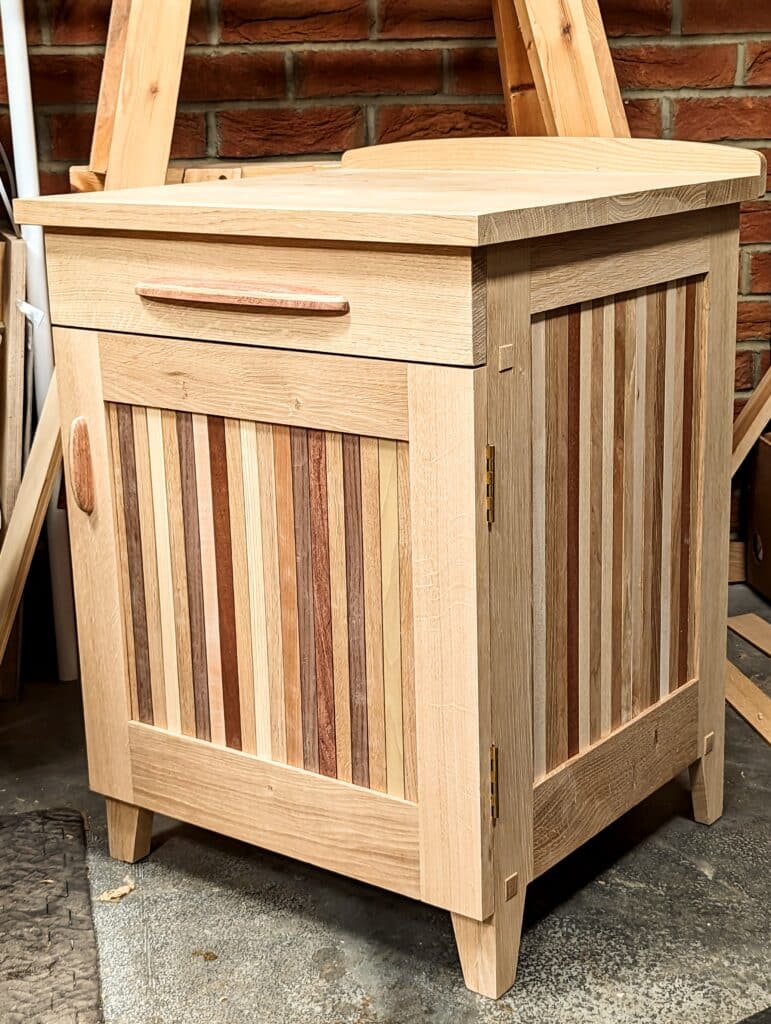
Two words come continually to mind in the design of life we humans engage in contribute to — creativity and inventiveness. We perpetually sharpen our output as creatives when we are involved in the making of diversely different things. At different points in my life, my inventiveness led to my developing unique methods of production to increase speed of production and maximise output. This necessitated the use of machines, the adaptation of machines and the conversion of machines to take out the risk of human error. My work before that point was hand work. Tenons from tenon saws and mortises from chisels and mallets. That too was creative but ultimately became a step in the invention of not only the product but the whole production system. Once it was established the end result was faster money-making in greater volume along with tedium and boredom and the use of my body as a slave to the system I created. I decided then and there to stop the system and the conveyor belt production line and climb off.
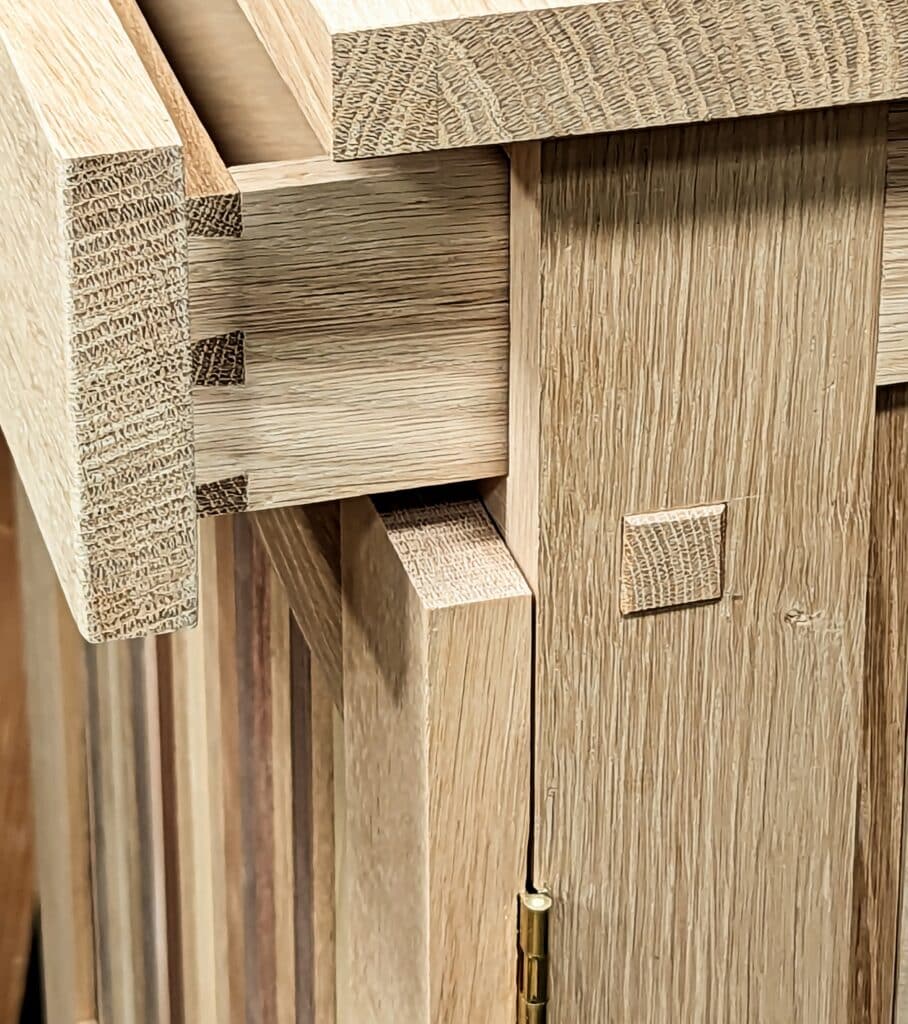
By my one simple decision, something I had wrongly taken for granted and lost was released back to me — creativity and inventiveness. To truly understand just how powerful words like these are in our lives we must go to the root of their origin. My love for woodworking is only equalled by etymology. When I became an expert woodworker in my late teens and early twenties I spent the next ten years thinking I knew everything I needed to know. It was in these years that my love of things woodworking lost their dynamic and I lost the essence of the interest I had earlier enjoyed. Why? It found truth and meaning in the word inventiveness. This word simply means we take an unsolved issue and develop a means by which we try to find the path to resolve any hindrance to a conclusion. It’s often the means by which we take what we already know to set in motion a mechanical step-by-step process that did not before exist; the utilisation of powers of nature be they already long known or more lately discovered by investigation. Our discovery brings to light what already exists, but was as yet unknown. Gravity, leverage, compression of wood fibres, expansion and contraction are all naturally occurring phenomena we woodworkers rely on in our craft. We drive pegs and wedges into and through tenons to expand parts and at the same time compress others. The root of the word invention is discovery: invention means to come upon, to find; to find out; to invent, to discover, to uncover; to devise; to ascertain; to acquire and so on. I once took a power jointer and made tenoning machine from the cutterhead and motor without changing the existing use of the machine as a planer. A two-minute conversion gave me the ability to put a thousand very accurate 1 1/2″ long tenons and inch-and-a-half wide on the ends of my oak pieces in a couple of hours. It was inventive and as far as I knew had never been done before. I used it for ten years with no issues and it saved me thousands and made me thousands too.
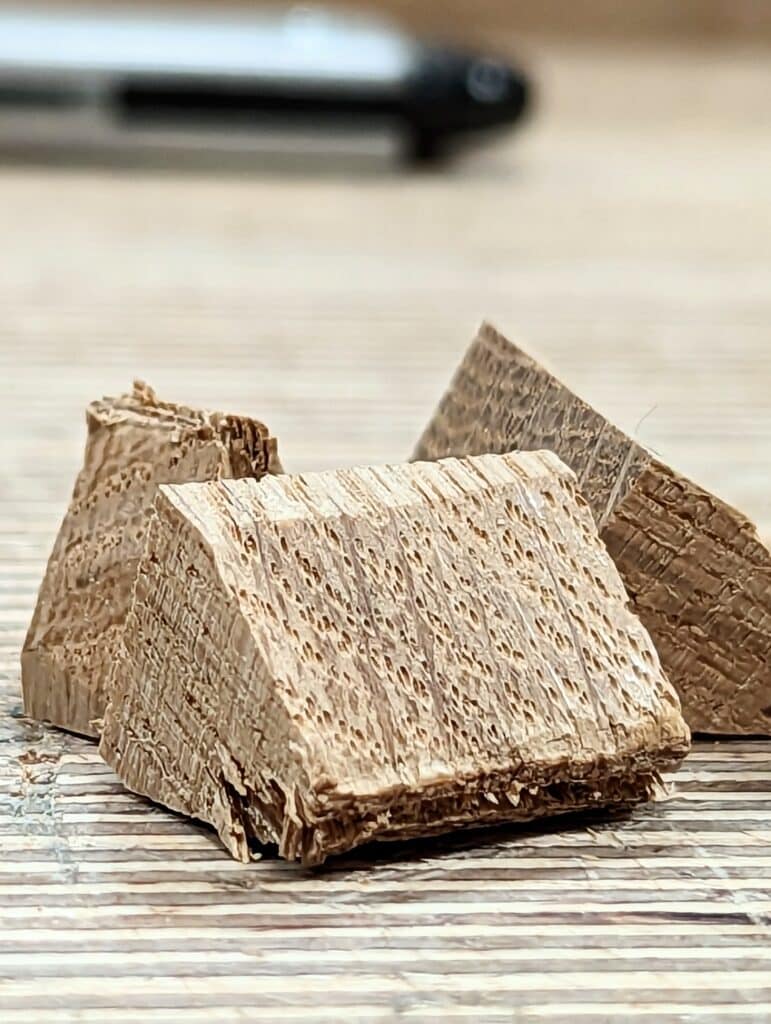
It’s often in the waste wood of shavings and chips that I see the difference between my life as a lifetime lifestyle woodworker compared to other so-called professionals. They, most of them, 995 of them, will never see the tail recesses removed with a sharp chisel and the reflection of sharpness glistening from the cross-grain cuts.
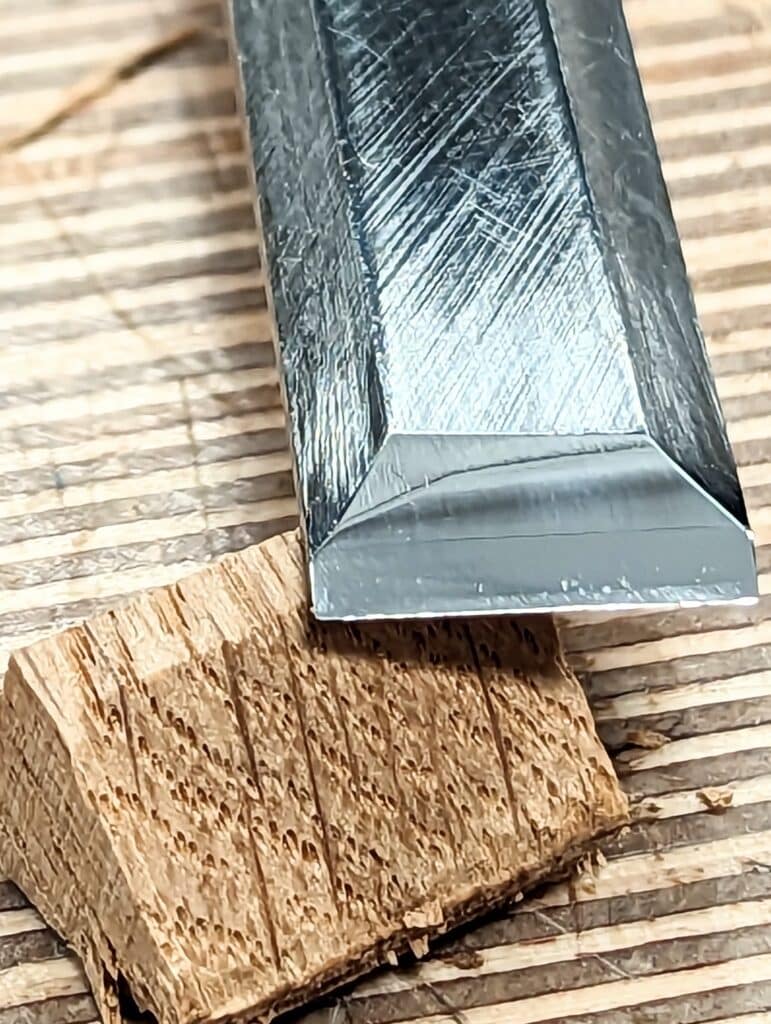
Today my life is utterly different than in those of that intermediate period when I needed to increase production levels to satisfy the demand for my then more mass-made work. I was in the valley of decision where I needed to see what was not to see what something was. Seeing the first of my two bedside cabinets replete with the finish on took me back to when I was a teenager making my first commission for six bar stools using only my hand tools. I am still using some of the very same hand tools today but enjoying them all the more after over fifty years of using them. What did I invent on this project? Well, not so much an invention as just a few simple ideas. The panels are a bit different but then there are all of the ingredients inside, the complexity of never-to-be-seen joinery in harmony and solidity. Despite the opinions of others via the Facebook post I put out a week or so ago, the outcome simply pleases me. You see, I knew what I was doing. Design is not just how the thing looks when done, it’s the composition of inventiveness and creativity in the internal workings of the joinery. Remember, the root of the word joinery comes from the word harmos, where we get the word harmony. The design is uncompromisingly mine. It made me happy.
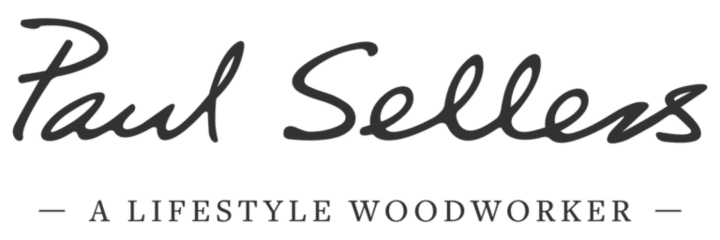

Very inspiring. Right now with my regular job, and all the wood projects I want to get done, I can’t do strictly hand tools (I use a tablesaw, jointer, etc.) but I have them, and pretty much do all my joinery by hand. I can’t wait to retire (2 years) and finally be able to do almost everything by hand. It may be “slower” than mass production work, but it will be much more fun! Thanks again for writing about your philosophy of hand tool work.
And there is nothing wrong at all with using machines. I may end up with some physical limitation as I gain age that will necessitate my using them again but, right now, I think using them keeps me fitter than I would be if I didn’t.
I would love to see how that converted tenon rig looks like.
Your writing is inspiring and gives hope to many who just dream about living the life you have, but unfortunately followed a path that keeps them in an unfulfilled job that brings in a steady paycheck. I have more hand tools and machines than one person should have, but always lacked the confidence to believe I could make a living at woodworking.
Thanks Paul. Those parts that are unseen but very nice because of how I did them is a silent perk of the work. I love it when the inside of dovetails have no torn fibers. Only I know about it and it makes me smile. I figure maybe in 100+ years if my piece survives and goes to a furniture repair shop maybe the repair person may notice how nice some of these hidden parts are when regluing and may think to themselves of how nicely it was executed. That makes me smile as well.
Thoughtful piece Paul, thanks. I think there’s also meaning as well as inventiveness and creativity. In my job as a software consultant, I was constantly creative (and well paid for that), designing systems that worked and problem solving and automating. However, it became apparent (and a lot longer ago than I care to admit) that it was in pursuit of nothing. My creativity was actively taking the creativity out of life for others, by designing ever more efficient processes that do what was done in two hours in two minutes with a button click and some coding. But then those tasks were meaningless too, anyway, so maybe it was okay, I thought. The thing is, anyone who’s worked in an office doing office work (accountancy, purchasing, etc etc) knows that their job isn’t really that important, so there’s a constant strive to introduce – or falsify – importance. That’s done through management, and meetings, and courses, and meetings, and “clients”, and meetings. All very serious, of course, because it doesn’t work without the seriousness. In my view, what we’re really talking about here is “the system”, and the bureaucratic management of that system – those jobs, my job, exist purely for that purpose. As soon as we begin to abstract our roles from life’s fundamental needs, in pursuit of the middle man of money, then they lose meaning. It appears to me that your machine working days worked in service to that abstract system (be it socialism, capitalism or whatever) rather than the fundamental need of making furniture. In short, you were exploited, just like I am, knowingly or otherwise. You fed the system with your labour and it returned you its tokens that you gave to someone else in the system to give you back things that you need and don’t need. It’s hard to calculate what I’ve lost, and am still losing, in my years of service to this system, but it can probably be summed up in lost connection(s). I’ve lost connection to my food and where it comes from, my shelter and how it’s built, my water and where it comes from and goes back to – all my basic needs (things that humans have always known and done for themselves) are packaged up and served back to me by the system in return for my obedience in keeping that system going. I think what your writings and videos have done, is to help me take a little bit of that direct responsibility (as opposed to indirect via money and taxes) back in a small area of my life, whilst cementing my distain for consumerism. Even if you might not have meant it! Thanks.
Man, Rico I feel the same after a number of years in IT related. Great summation. Furniture making and crafts by hand of any kind reconnect in a way so primal, I can no longer yield nor do I want to.
First, Paul you hit the nail on the head. Thank you for your contribution to this school of thought and the forum to communicate back with like minded people. This has value and is positive.
Rico, I too work in technology and agree with your insights. Jumping off the merry-go-round has been a goal of mine for nearly 20 years. Being some 15 years away from retirement this seems a long way off. That said, I’ve always had this sense that fulfillment was somewhere else, doing something else. Successes in IT are fleeting and their meaning and value is even more so. It’s great when we can figure out some problem using the tools we’re trained to use, but to the point I think you made so well is the lack of enduring value and real contribution to this life. So much of what we do is self serving, void of soul and repetitive.
My learning what is probably best described as a hobby for me has been a pleasant distraction and more fulfilling to me than my chosen career. I’ve often wondered what this says about me as a man, father and husband. I have no answer to this. I suppose that question is for those that come after me to contemplate. Legacy.
I advise my now grown children, until I’m blue in my face, to choose work they love. Work that allows them to be themselves and gives them pleasure, all the things Paul reminds us of on a regular basis. I wish there was more instruction and conversation like this available to the masses in primary education. Perhaps if there were we’d be a more content society with a more lasting sense of accomplishment and satisfaction.
I am building a foot powered scroll saw (all wood except for knobs, wing nuts, threaded rod, etc.). I have to admit that I like the engineering and building aspect of this project more than spending an hour or more trying to get a board flat. I don’t mind joinery by hand at all but I do have to admit that I get burned out from it at times. I do not like electric machines but do like the old machines powered by people. My my father’s father (my grandfather) that I never met but whom I’m named after was some what of an engineer for General Electric which is where I might get the interest from. The company would give him materials to lets say draft and make a toaster for production. If this project works, I may try building a foot powered table saw. I don’t think a foot powered joiner would work.
That sounds like a fantastic project Anthony. I like the idea of a rowing machine style band saw. I say band saw, but it’d be for long rip cuts rather than feeding the wood, where the rowing part just pulled a large frame saw. I like rip cutting wood, but it can be tiring, and I feel like I’m not utilising the whole power of my body (legs especially) when sawing. Anyway, I haven’t the skills to design such a thing unfortunately! The problem would be feeding the workpiece in. And the long blade. And all the other hurdles!
I’m glad to hear that you are well. There must be something positive to the body for an active life. Many friends and relatives with desk jobs have back, spine and hand/wrist problems. My friends with active jobs for the most part do not have problems with knees, back, ankles etc..
Glad to hear it, however, the guy I used for construction jobs in my house has wrists, ankles, and knees replaced including neck surgery from a life of laboring.
I love everything you just said.
A foot powered table saw would be incredible to see and use. I hope to find out somehow, one day.
Thanks Ian. I will post when it’s finished.
I wonder how the first cathedral builders at the end of their age felt when specialists took over their work. Or when the Enclosures Act and the early capitalists took away the commons and forced the farmers and cottagers into deadly and boring factory work. We like to think that our age is the ‘modern age’. Think of when electricity first entered mass use. Or cars. Or World Wars. Such volcanic change disrupted the prior systems, some for the better, some not.
Very thought-provoking post!
I always like to hear your thoughts, Paul. I have to say, you may have overlooked the power of boredom as a creative force. Beloved singer/songwriter John Prine composed his early songs while walking his daily mail route. They called him the singing mailman. Having a job that lets your mind wander frees it for other more creative pursuits–if one is so inclined.
My current wood project is the finish trim on an addition we had built last summer. Starting with rough lumber, it feels like grunt work, but it’s almost done. I can’t wait to finish it and start making the bookshelves and furniture for the new space and once again get to the creative part. My head is full of design ideas. Then, when our library is done and I have a perfect place to write, maybe I’ll finally finish that novel. Hmmm… everything perfect. When does that happen??? Could one form of creative endeavor be procrastination for another? Boy I love being retired when these are the big questions!
On the subject of pain: The International Association for the Study of Pain (IASP) defines it thus, “An unpleasant sensory and emotional experience associated with, or resembling that associated with, actual or potential tissue damage.”
If one is a typist, or bus driver, or coffee maker, there is without question very little variance in the activities or motions they perform throughout the course of the day. We find that with repeated actions or postures overuse occurs, and those actions and postures become faulty, and then are again repeated in that faulty state. Over time this results in the “disease” state, if you will.
The emotional state further affecting the pain and posture, and the pain and the emotional state.
From all I have seen of your work practices, you have very good ergonomic design for your work stations. This perhaps in part being the culmination of millennia in woodwork station design. That’s not to say there aren’t times and situations where things have to be awkward for a moment. But generally speaking, when wielding a chisel, the sense of self preservation is so overwhelming that we’re far more likely to find a better position.
The variance in task is also of benefit. Design, going and selecting the stuff, marking out, gauging, cutting, planing, chiseling, gluing, sanding, finishing, all have different postures, grips, actions. That’s not to say there aren’t woodworkers with faulty posture. A six footer working on a thirty six inch bench for a year is going to find out their back hurts. But by and large hand woodworking is a very good activity for the health of all your bones, joints, and muscles if done correctly.
The other element being the emotional one. The pleasure received from the work itself, and the outcomes, are of immense benefit in preventing pain from ever developing into something chronic.
One might be sore after a hard days work, or stiff in the morning, but the pleasure received and the desire to do it again helps draw the body back up and keep it moving.
I like your posts and sentiment.
This was a long one.
Having studied pain at one point in life (for ten years, cough), I couldn’t agree more.
Ben out
Your description is much like the journey of life. I am enjoying your YouTube programs and trying to see them all.
God Bless you for what you do.
La soddisfazione che si prova nel vedere realizzati i propri progetti è unica, e solo chi ha la fortuna di potersi cimentare in queste attività artigianali lo può capire. Ho 45 anni e attualmente sto preparando la strada per potermi godere questa attività artigianale quando avrò oltrepassato i 60 anni, sempre che la natura me lo permetta. Oggi cerco di tenere separato il mio lavoro (che non sempre mi da soddisfazioni) dall’attività in laboratorio che al contrario mi da sempre quella serenità di cui ho bisogno, anche quando posso dedicargli poche ore alla settimana, anche quando commetto un errore. Ma niente può ripagare la tranquillità che mi trasmette guardare una delle mie creazioni.
I am adding the translation. It may not be perfect. Paul
The satisfaction one feels in seeing one’s projects realized is unique, and only those who are lucky enough to be able to try their hand at these craft activities can understand it. I am 45 years old and I am currently paving the way for me to be able to enjoy this craft activity when I am over 60, if nature allows me. Today I try to keep my work (which doesn’t always give me satisfaction) separate from my work in the laboratory which, on the contrary, always gives me the serenity I need, even when I can dedicate a few hours a week to it, even when I make a mistake. But nothing can repay the peace of mind that gives me looking at one of my creations.
I keep trying to use just hand tools if I can manage it, after having quite a bad accident a few years ago that makes me ache a bit some days. I like the idea of it keeping you healthy rather than using a machine. It also helps to hone your skills as a joiner rather than relying on a machine that does it all for you……..
There’s no question that some “work” provides greater opportunity for Creativity and Inventiveness. These two qualities are certainly primary motivators for Woodworkers, I’m sure. But until robots and AI take over all the “boring” jobs (bus driver, garbage collector, mail deliverers, cashier etc.) somebody will be providing these necessary “services” of us. And even in those occupations there is “redemption”. As a member of the Baha’i Faith, I’m taught to treat work as “worship”. To offer it as a prayer. And that in “service”, as a servant I am fulfilling my purpose for existence at a very high level. To be a “Servant” to Mankind is a most high calling. I guess my point is that there are other spiritual qualities to work besides creativity and inventiveness as special as they are! And don’t get me wrong, as a woodworker I appreciate and prize them greatly! And thank you Paul for taking us deeper into the subtler realms of what may appear to many as a purely physical activity.
As you will know, the Baha’i Faith is a gathering of many ancient faiths and those seeming to be relatively new in concept good working is an ethical practice. Look into many faiths and work is honest worship. Instead of being a recently developed faith, many go back millennia and mean no less today as when they were first scribed. All work is honourable but no matter which faith-based religion you add to it some work is entirely tedious and allocated to certain groups and people types for the wrong reasons. You will not get people in certain professions to drive your bus, deliver your mail or work as a cashier. It’s doubtful to me that robots and AI will be anything more than further dehumanising because of who will own the technology which will not be the common man and woman.
There’s an apocryphal story I heard many years ago from Bob, a very talented cabinetmaker I know:
During the construction of the Cathedral of Notre Dame in Paris in the 12th Century, an artisan is working to carve a stone statue of an angel. The detail he is carving into the stone is amazingly intricate.
Bishop Maurice de Sully comes by during an inspection tour of the construction project. He admires the statue-in-progress and congratulates the artist on his work.
“Where will the statue be placed when it is finished?” the bishop asks.
“Up there,” the artist replies, gesturing toward the highest pinnacles of the edifice.
“Nobody will see it once it’s installed,” the Bishop replies. “Why do you put so much effort and care into it? Nobody will see it or know what you have created.”
“God will know,” is the reply.
That is another way of saying the same thing that you have said here, Paul.
One can choose to do a job right because “God will know.”
Bob and I exchange that comment often when we are talking about quality workmanship in a place where it will not be seen. “God will know.”
All my jobs during my 45 years of working were enjoyable and engaging.
Sure there were some boring bits but all in all I consider myself fortunate to see real results from the things I made or made happen.
But all the jobs I held, everyone of them is obsolete now and of no practical use anymore because of technology. These things that I had to train for get done today without any real skills needed. That is why woodworking is one of my passions, I will learn from this craft until the end of my days.
Reading this I am reminded of something I heard Garrison Keillor say on “A Prairie Home Companion”
“I would have done great things with my life but I was trapped by a good job.”
Thanks Paul for the insights
Randy